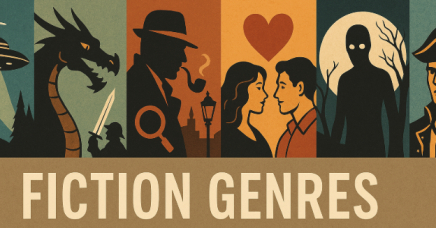
Everything You Need to Know About Comp Titles
March 27, 2025
What Exactly Does a Book Editor Do [And Why Do Authors Rely on Them?]
April 6, 2025A genre shapes the way an author approaches their writing, influencing the style, focus, and structure of a novel. It serves as a blueprint that guides the stories we tell, whether in art, music, or literature. Each category follows specific rules that define manuscript length, character types, and settings that best suit the narrative. The themes, viewpoint choices, and plots must align with the expectations of a particular genre, ensuring the right tone and mood for the reader.
The comfort of picking up familiar books or revisiting a favorite novel feels like sitting down with an old friend, knowing the narrative will unfold in a recognizable way. For writers, these structured boundaries serve as creative models, guiding them while allowing space to evolve and push trends within society. When new ideas emerge, the success of an experiment depends on whether readers embrace it, ultimately reflected in buying habits. However, at its core, fiction remains a powerful tool to fulfil our human craving for immersive storytelling, helping us momentarily escape the harsh realities of life while giving us something to rely on.
Let’s dive into the 15 most common fiction genres:
Top 16 Fiction Genres
1. Romance
At the heart of romance lies an emotionally charged relationship between two people, often filled with sensual tension, deep desire, and a touch of idealism. These stories captivate readers with the journey of love, where an author skillfully keeps the couple apart through challenges, only to bring them together in a satisfying conclusion.
The genre is vast, embracing various sub-genres such as paranormal, historical, contemporary, fantasy, and Gothic, each offering a unique flavor of storytelling. Additionally, common tropes and structured storytelling make these novels engaging, ensuring a familiar yet exciting experience for fans of this ever-evolving category.
2. Action Adventure
An Action Adventure story thrusts the protagonist into intense danger, demanding courageous and daring feats to survive. Known for its fast-paced nature, this genre keeps the tension high, with thrilling twists and near misses as time relentlessly ticks away.
Every moment feels like a race against the clock, leading to a gripping climax that finally grants the reader a sense of relief. Whether escaping peril or confronting the unknown, these narratives are characterized by relentless excitement and adrenaline-fueled stakes, making them an electrifying experience.
3. Science Fiction
A Science Fiction story transports readers to the future, the past, or even alternate dimensions, where advanced technological breakthroughs and scientific ideas shape reality. This genre demands that writers invest in building immersive worlds, carefully crafting a setting that helps define the plot. Whether exploring space, time travel, or AI, authors rely on genre-specific words to create authentic narratives.
With numerous sub-genres and a vast array of tropes, Sci-Fi provides endless creative possibilities for those willing to push the boundaries of imagination.
4. Fantasy
In the realm of Fantasy, stories often revolve around kingdoms, unlike sci-fi, which explores vast universes. Writers dedicate significant effort to world building, crafting intricate settings inspired by historical periods like the Dark Ages. These books are distinguished by myths, otherworldly beings, and magic-based concepts that bring imaginative ideas to life. Each genre has its own structure, and Fantasy is no exception, featuring a rich terminology, countless tropes, and a variety of sub-genres that allow endless creative exploration.
5. Speculative Fiction
Speculative Fiction encompasses stories set in worlds that differ significantly from our real world in crucial aspects. This genre often blends elements of science fiction, fantasy fiction, horror fiction, supernatural fiction, superhero fiction, utopian and dystopian fiction, apocalyptic and post-apocalyptic fiction, and alternate history.
Writers craft narratives that challenge reality, introducing alternate possibilities shaped by advanced technology, magic, or speculative social structures. These genres allow authors to explore profound themes and create immersive worlds that captivate readers.
6. Suspense/Thriller
A character in constant jeopardy drives the intensity of Suspense/Thriller stories, where pursuit and escape create an adrenaline-fueled experience. This genre thrives on cliffhangers and the looming presence of dark figures that the protagonist must fight against, escape from, or best. The threats—whether physical or psychological—heighten the tension, making the setting a crucial part of the plot. Often described as a gripping read, these books keep readers on edge. A Techno Thriller, incorporating high-tech elements, is a notable sub-genre of this compelling category.
7. Young Adult
Young Adult fiction, often referred to as YA, is a genre that captivates both adolescents and young adults, though its appeal extends beyond its target audience. These books, often featuring diverse protagonists, explore coming-of-age stories where characters navigate significant changes and challenges.
While published and marketed primarily for readers between 12 and 18, as defined by YALSA (Young Adult Library Services Association), the reach of YA novels stretches to adults who appreciate their engaging narratives. Frequently overlapping with fantasy and science fiction, this category has surged in popularity due to the success of titles like The Hunger Games, Twilight, and The Fault in Our Stars.
8. New Adult
New Adult (NA) fiction is a genre that bridges the gap between Young Adult (YA) and adult literature, featuring college-aged characters instead of school-aged ones. These books delve into the challenges and uncertainties of leaving home, navigating newfound independence, and stepping into adulthood for the first time.
Unlike YA, NA novels often blur the boundary between romance and erotica, frequently incorporating themes of sex and emotional exploration. As the next age-category up, this category resonates with readers seeking more mature, relatable narratives about self-discovery and personal growth.
9. Horror, Paranormal, and Ghost
Horror, Paranormal, and Ghost stories thrive on high-pitched suspense, keeping readers on edge as the protagonist faces relentless pursuit and fights for escape. These scary stories often feature supernatural or demonic beings, pushing characters to their limits in their struggle against unknown terrors.
The Occult serves as a chilling sub-genre, frequently introducing satanic-type antagonists who heighten the dread. Within this genre, numerous tropes shape the narratives, reinforcing themes of fear and survival while keeping the tension gripping and unpredictable.
11. Mystery and Crime
Mystery and Crime fiction, often referred to as whodunits, captivate readers with intricate plots where a question must be answered, an identity revealed, or a crime solved. These novels are characterised by carefully placed clues, each building rising tension as the mystery unfolds. The journey toward uncovering the truth keeps readers engaged, with each twist heightening anticipation. Within this category, various sub-genres offer unique takes on classic investigative storytelling, ensuring that no two cases feel the same.
12. Police Procedurals
Police Procedurals are a gripping mystery sub-genre where a police officer or detective takes center stage in solving the crime. These stories emphasize the technological and forensic aspects of police work, showcasing the intricate process of sorting and collecting evidence. The legal framework of criminology plays a crucial role, adding layers of authenticity and complexity to the investigation. Readers are drawn into the methodical unraveling of clues, making this genre both intellectually stimulating and immersive.
13. Historical
Historical fiction transports readers to factual historical backdrops, blending fictional stories with real events. Often, important historical figures are reimagined as fictional characters, adding depth and authenticity to the narrative. A popular sub-genre, Historical Romance, intertwines a conflicted love relationship within a well-researched factual historical setting, allowing readers to experience both passion and history in a captivating way.
14. Magic Realism
Magic Realism blends magical events seamlessly into ordinary life, creating a world where the extraordinary feels natural. Unlike traditional fantasy, the characters in these stories do not perceive these occurrences as abnormal or unusual, but rather as an inherent part of their reality. The story unfolds with a dreamlike quality, making the reader question the boundaries between reality and illusion. A defining example of this genre is One Hundred Years of Solitude, a classic that showcases the beauty of this literary style.
15. Family Saga
Family Saga novels intricately weave the on-going stories of multiple generations, exploring themes of businesses, acquisition, properties, and even family curses. These plots often span vast periods, with a structured timeline that connects past events to contemporary settings. While primarily historical, these adventures highlight how legacies evolve, shaping the future through the struggles and triumphs of the past.
16. Westerns
Westerns transport readers to the old American West, where cowboys, frontiersmen, Indians, mountain men, and miners navigate the harsh landscapes of a rapidly changing frontier. These books capture the essence of survival, thrilling adventures, and even romance, all set against a backdrop of untamed wilderness and lawless towns. The plotlines reflect the era’s challenges, from territorial disputes to personal quests for justice and freedom.
Final Words
Whether you’re a writer seeking your niche or a reader exploring new horizons, understanding fiction genres helps you navigate the vast landscape of storytelling. Each genre carries its own conventions, expectations, and audience—but don’t let that box you in. Genres are tools, not rules. Many of today’s most compelling books blur the lines between categories, creating rich, layered experiences that resonate with readers on multiple levels.
If you’re an author working on a manuscript, choosing the right genre helps you position your book effectively for agents, publishers, and marketing. And if you’re not sure where your story fits, that’s where we come in. At Penman International, we help writers develop, polish, and publish their work—across every genre imaginable.
No matter what kind of story you’re telling, there’s a genre for you—and a reader waiting to discover it.



